Preparing for a move, as it turns out, is tedious, time-consuming, and has no task which requires more than 40% of my attention. While I’m perfectly happy distracting myself with music and video essays loud enough that I get a warning pop-up on my phone or tablet, other people live here too and would like to hear themselves think. It is for this reason that I bought what many consider an antique – an mp3 player with a clip that attaches directly to the back of my hat. I used to do the same thing with an iPod Shuffle, proving that time is nothing but a flat circle.

Doctor Who, as it turns out, is perfect for an mp3 player like this. And with Tom Baker (the Fourth Doctor) involved, this led to some great discoveries on my part that built off of the better work he did in the original series.
Now, a warning: I know it’s tradition for Doctor Who reviews to assume that you’ve seen every episode, spoil literally everything about the original episodes, spoil the plots of the audio dramas, and make sure to specifically include the villains and how they’re defeated. This is objectively stupid and defeats the idea of actually experiencing something for yourself, so I think I’ll stick with recommending things and telling you why I like them.
For those of you just turning in after the 60th Anniversary Specials, or the fantastic 15th Doctor premiere “Church on Ruby Road” starring Ncuti Gatwa and Millie Gibson, check out this guide to the original series’ format, style, and some of the terms you might run in to if you’re talking with a Doctor Who fan.
Everything I’m recommending here is based much more on the storytelling of the original series. That means stories are divided to 4-6 half-hour episodes, have a deliberately slower pace, and tend towards a more psychological horror. And the audio dramas have a plus: no special effects budget to make a script unfilmable.
Tom Baker had a remarkable seven-year run, but as the production team changed over time, so did the series. So I want to run you through what material I actually like from the Fourth Doctor, so you have context for why I’m recommending these particular audio dramas.
An almost-not-quite review of the Fourth Doctor, sort of
His earliest seasons (Seasons 12-15) had Robert Holmes as head writer, and every writer afterwards has been in his shadow ever since. His partner, producer Philip Hinchcliffe, was always pushing the boundaries of what could be done with special effects, costuming, and kid-friendly horror. They were an incredible team. It’s no stretch to say that he was the best writer the show ever had, with comparisons to his scripts being made today. Russel T. Davies, current Doctor Who showrunner and one of the giants of British television, had this to say about him.
Take The Talons of Weng-Chiang… watch episode one. It’s the best dialogue ever written. It’s up there with Dennis Potter. By a man called Robert Holmes. When the history of television drama comes to be written, Robert won’t be remembered at all because he only wrote genre stuff. And that, I reckon, is a real tragedy.
Russel T. Davies
These seasons include the iconic companion Sarah Jane Smith, a journalist whose teasing, gentle humor led to a warm and friendly side to the often mercurial Doctor, sold these stories with a humanity that was never really replicated in the original series. She only makes an appearance in one story on this list, but she is wonderful and a perfect pairing with the Fourth Doctor. Her live action spinoff series from 2007 is excellent too.
She was followed by Leela, my personal favorite original series companion. Leela has a beautiful interplay with the Doctor. A tribal warrior whom The Doctor brings along to teach and help nurture her clever and intelligent mind, she expertly takes the wind out of the more learned and arrogant Doctor by coming to the point quicker and more simply. She is also quick to plainly point out fallacious nonsense, idiots and blowhards, in contrast to the Doctor’s more delicate touch.
His knowledge, her mind and physicality, and their mutual ability to find the answers made them the perfect duo.
This clip is a perfect distillation of what I like about this period of the show.
But I do like one other writer quite a lot! Far more important than any of Douglas Adams’ contributions to literature, science fiction, humor, computer games, and pretty much everything else he touched creatively, he was the head writer for Season 17 and wrote two really excellent stories, “City of Death” and “Shada.” And after he left, he most certainly did not write a few novels that were Doctor Who fanfiction with the names changed around either.
Season 17 of Doctor Who was a whole different beast. The show wasn’t horror-based anymore. It had brought in heavier comedy, a robot dog, and playful flirting between the Doctor and companion Romana. For the seasons run by Holmes, resilience and wiliness when backed in a corner were always what defeated the evils creeping in the dark. For Adams, the Doctor focused on becoming the wrench of a brilliant plot – usually by the Doctor being brilliant himself. Romana (played by Lalla Ward) had an exceptional warmth and chemistry with the Doctor, something not seen since Sarah Jane left the show. And I have always liked the intelligent companions best.
I know this only covers a few seasons of one Doctor. But this isn’t a guide to all of Doctor Who, it’s the stuff I like with this Doctor and why. With that out of the way, let’s get on to the (audio) show!
The Nest Cottage Chronicles
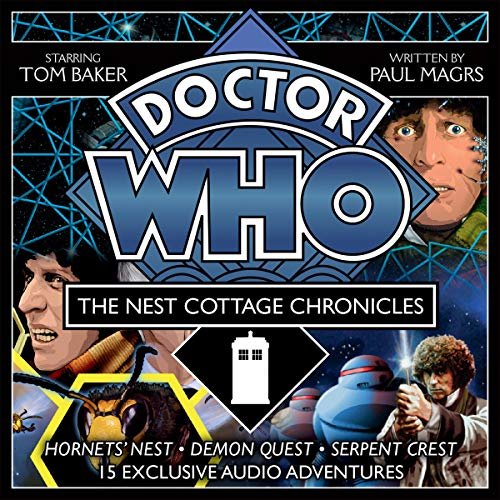
This is the only drama on this list produced outside of the production company Big Finish, who handled most of Doctor Who’s radio plays since 1999. The Nest Cottage Chronicles are Tom Baker’s first audio dramas since he left the show, and they are exquisite. Mike Yates, a character from the original series, meets the Doctor some 30 years after their last meeting, and is drawn into a complex plot involving the Doctor, a taxidermy, housekeeper, and a curious amount of brandy.
Breaking format from a traditional radio play, they almost work like audio books with the Doctor narrating a great deal of the action – author Paul Magrs said he considered its format as “a storyteller sitting comfortably by the fire.” There is still a full cast, and everyone brings their A-game, but Tom Baker (as is his wont) is the star of the show. His performance is filled with luscious lines, and Paul Magrs proves himself to be one of the best writers for the Fourth Doctor not just in audio, but in any medium.
There are three series of audio dramas, each running about five and a half hours: “The Hornet’s Nest”, “Demon Quest”, and “The Serpent Crest”, each with five parts. I suggest you listen to all of them. Not only are they fantastic, they manage something that I thought was impossible – a fresh take on a Doctor who was revamped and retooled multiple times throughout his seven year run on Doctor Who. Nobody could write these like Paul Magrs.
That said, do you know how irritating it is to have one of the best writers for the Fourth Doctor not be given a chance to work as a regular Big Finish writer for that Doctor? They record enough series with the Fourth Doctor, surely bringing in a writer with more with 16 proven hours of brilliance is a good idea.
Philip Hinchcliffe Presents
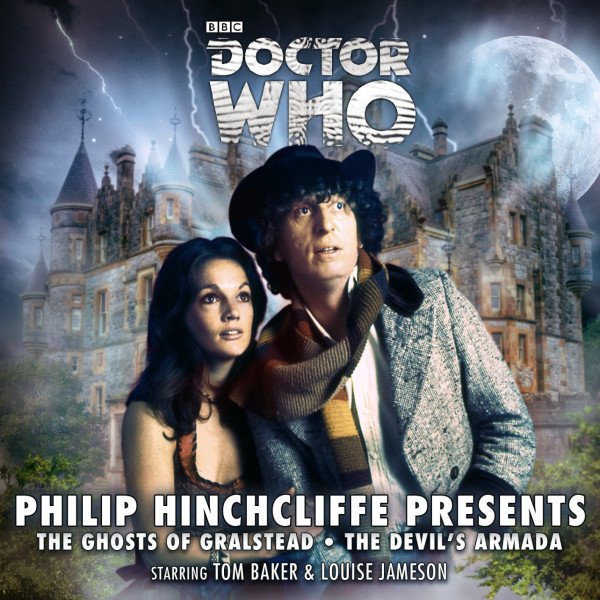
Producer Philip Hinchcliffe’s notes and story ideas, not all of which could be fully realized before he was removed from the show (or could be realized at all with their budget), have led to something wonderful: audio adaptations of the works he and Robert Holmes wanted to do. Marc Platt takes scripting duties with a deft hand, Hinchcliffe’s supervision shows in these scripts pushing rather than pulling back, and I love every bit of it.
They are ambitious, intriguing, and feel authentic to the period of the original series that I love the most.
There are currently just six stories, all starring Leela and the Doctor, but that does mean the equivalent to an entire series with one of the best pairings on the show. I would love for Hinchcliffe and Platt to do more, perhaps even supervise a range of stories with people willing and able to push in that direction. As noted in the next entry, there are two more writers proven to be exceptional at bringing stories like this to life.
The Lost Stories – The Fourth Doctor Box Set
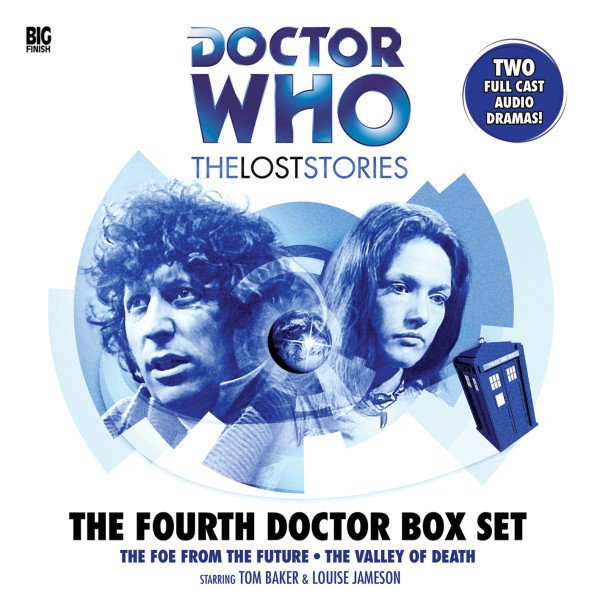
This feels a bit like cheating; this box set is almost a pilot for Philip Hinchcliffe Presents. The two stories in this box set, “The Foe From The Future” and “The Valley of Death”, were originally written by Robert Stewart Banks and Philip Hinchcliffe respectively, and adapted by John Dorney and Jonathan Morris in turn.
As these scripts were written during production of the original series, their authenticity is exceptional. John Dorney had the unenviable task of writing Episode 6 of “The Foe From The Future” from scratch, since the original writer never completed the script or left notes. He did it. It feels right. Bravo, excellent, A+ efforts all around, please let these two pitch on the theoretical Philip Hinchcliffe-run line that I just made up in that last section.
The Lost Stories – Series 6
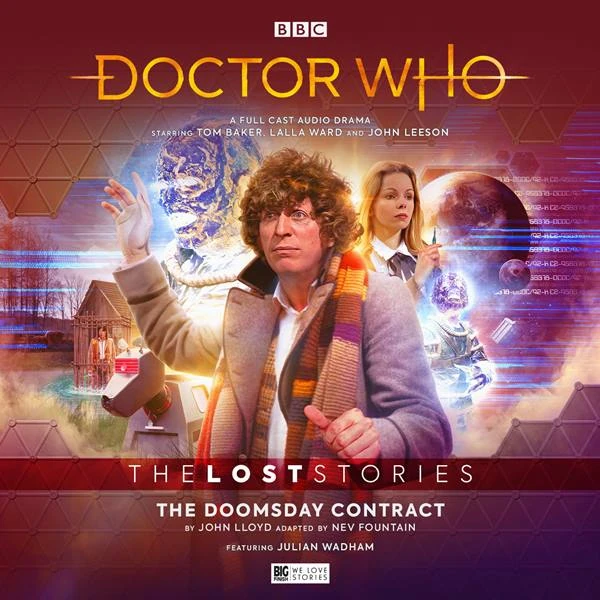
This is a weird one consisting of two stories that have absolutely 100% nothing to do with each other in origin, style, tone, or even era of the show: “Return of the Cybermen” and “The Doomsday Contract.”
“Revenge of the Cybermen” is a pretty bad and skippable story from Season 12, while “Return of the Cybermen” is an alternate take based on Gerry Davis’s draft prior to Robert Holmes’ rewrites. For some people they’ll find it more interesting than good, which is fair, and it is probably the weakest story on this list. Considering how discerning I am about Doctor Who as a whole, it’s still a genuine recommendation – and the only full story so far with Tom Baker acting alongside Sadie Miller, the new actress for Sarah Jane Smith (and as it so happens, original actress Elizabeth Sladen’s daughter.)
“The Doomsday Contract”, on the other hand, feels like Douglas Adams’ scripts in a way which is almost disturbing. Adams’ friend John Lloyd was meant to write for Season 17, but budgetary problems made that impossible. Fortunately, there is no special effects budget to worry about in a radio play. Clever, interesting, and unique. Witty dialogue. A great premise. And you can really only watch “City of Death” and “Shada” so many times before you get curious as to what another story in that vein might look like.
Doctor Who – The Novel Adaptations
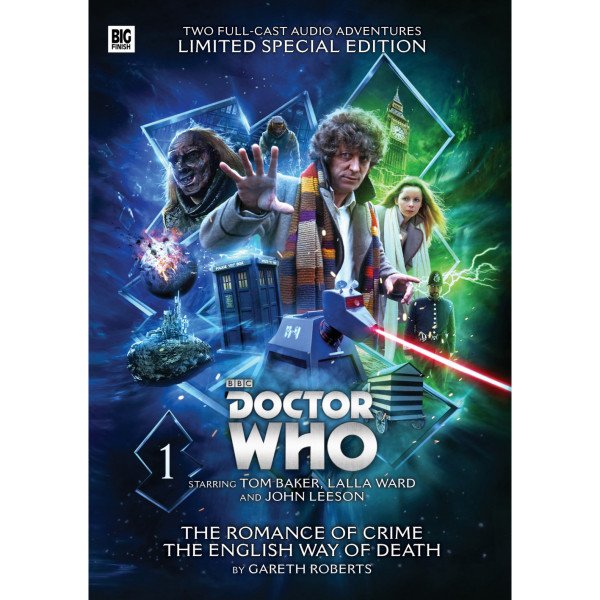
Gareth Roberts is a transphobic jackass and has been kicked out of all aspects of Doctor Who, including television, comics, and novels. This is a positive thing! But before he was known solely for his denial of science and reality while whining on twitter, he wrote wrote things that were really good. “The Lodger” is probably the best episode that the 11th Doctor ever had. But I still bought the audio adaptations secondhand because I wasn’t interested in giving the man royalties.
The three novels that were adapted to audio are “The Romance of Crime”, “The English Way of Death”, and “The Well Mannered War.” They’re quite good. Strong jokes, good plots, and the Doctor and Romana are beautiful together. But not knowing how royalties work for Big Finish, I strongly suggest buying them secondhand unless someone is able to clarify how writers are paid for CDs and downloads.
I actually hope there are royalties, the talents behind these plays deserve to get paid. But not Gareth Roberts, who can go straight to hell, do not pass go, do not collect 200 dollars. For those interested in the adaptations regardless, eBay is your friend here. But I understand if you would rather avoid the stuff in the first place.
The Comic Strip Adaptations
And at the absolute last second, I snuck a surprise comics review in here! Sort of! We’ll get to the actual Doctor Who Magazine stuff another time. This box set first adapts “The Iron Legion”, the very first story from the magazine Doctor Who Weekly, the original story is great and the audio drama is just as weird, entertaining, and fun as its source material. Its second adaptation, “Doctor Who and the Star Beast”, is better known now as one of the Fourteenth Doctor’s specials. But both the comics and audio dramas are worth a listen, being different by way of performance and script. It’s weird. It’s fun. I love it.
If you can get a hold of the original Doctor Who Magazine reprints, collected in “Doctor Who – The Iron Legion” and “Doctor Who – Dragon’s Claw”, they’re oversized and absolutely incredible. It’s the format I get them in, since Panini has been reprinting every single story in those magazines.
But if you’re looking for something that’s actually in print and a bit more affordable, consider this volume, which has every Fourth Doctor story from Doctor Who Weekly/Doctor Who Magazine – the same contents as above, but with a few less bonus features.
Where To Get These
That ends the list, really. If you’re looking to purchase digitally, Big Finish’s store is fantastic and every audio here is available for purchase. There are sales for various parts of their catalog pretty much every day, with the specifics changing roughly as one would expect from a benevolent Mad Hatter.
The CDs are available for purchase there, but for American fans looking for CDs, Big Finish isn’t my first choice.
Instead, check out Mike’s Comics. They’re an official US distributor for Big Finish, their prices are reasonable, and their customer service is exceptional. It’s where I got most of mine. Many are going out of print, so if you care about physical media (which I have talked about more than a few times), this is a great way to go and actually cheaper than Big Finish’s website.
And if you want to sample anything here, Big Finish’s spotify has numerous stories from all over their 25 year time working on Doctor Who. I absolutely guarantee you that you can find some other great ones I don’t know about; there is more to Doctor Who than Tom Baker.
But that’s currently it for my list of Fourth Doctor audios that I like. There are incredibly talented people working at Big Finish, and I like other work they’ve done, but I haven’t found stories with the Fourth Doctor that truly grabbed me. What I have heard from the first few series of “The Fourth Doctor Adventures”, his ongoing audio series, has been consistently solid rather than exceptional. If I’m missing something you love, please let me know, because I will eventually run out of stories to listen to.
(Also if you’re just getting started with the Fourth Doctor on television, don’t start on his first story, “Robot.” You only have so much time left on this earth, it is representative of literally nothing that happens in the entirety of the character’s seven seasons on the show, and more than that the story is actively unpleasant to watch. Just skip to “Genesis of the Daleks.”)
